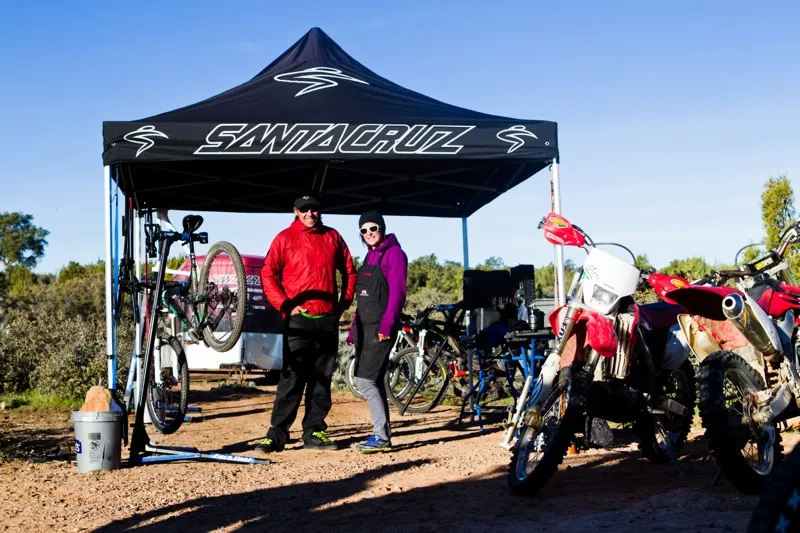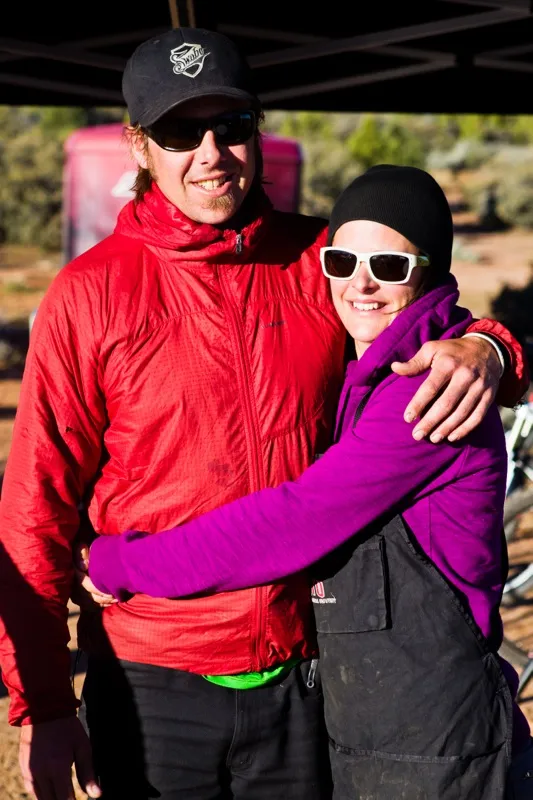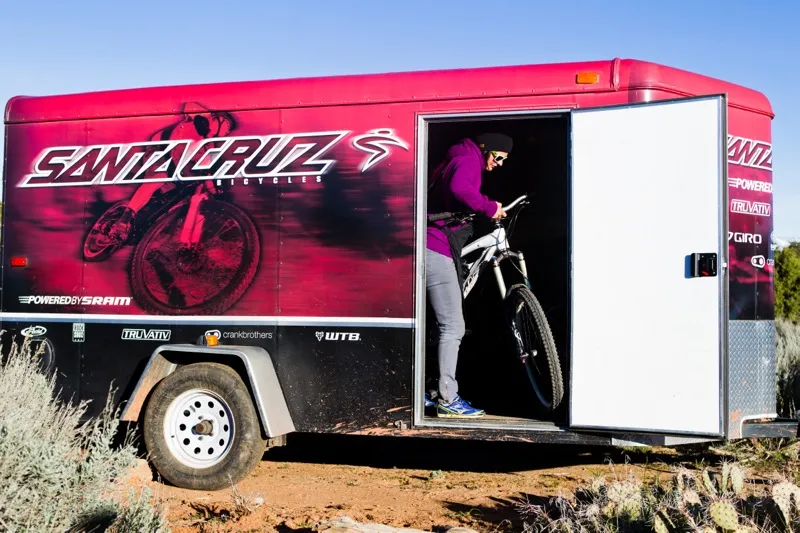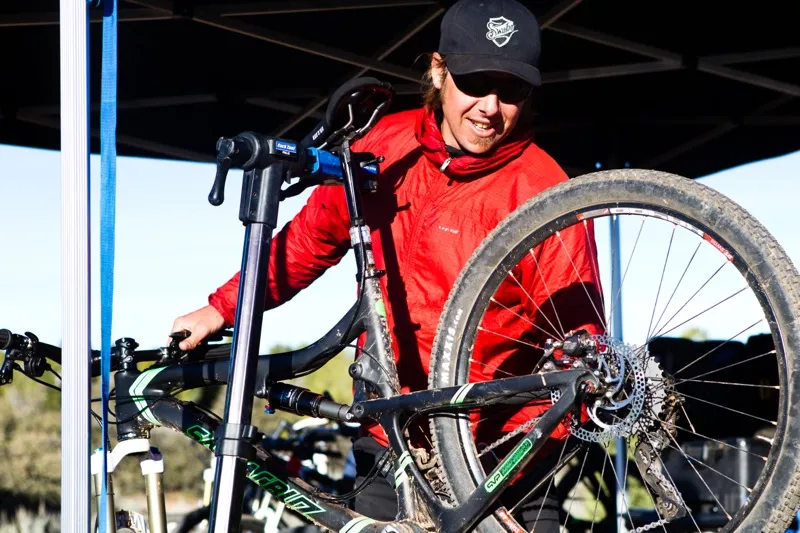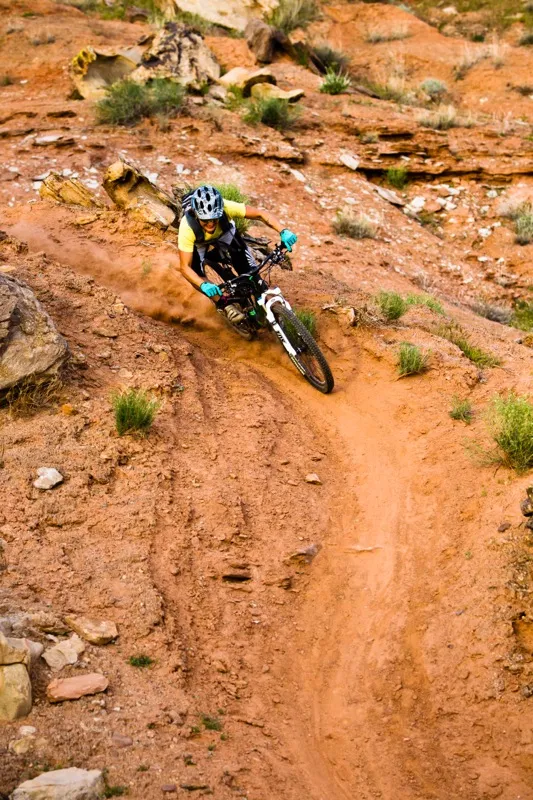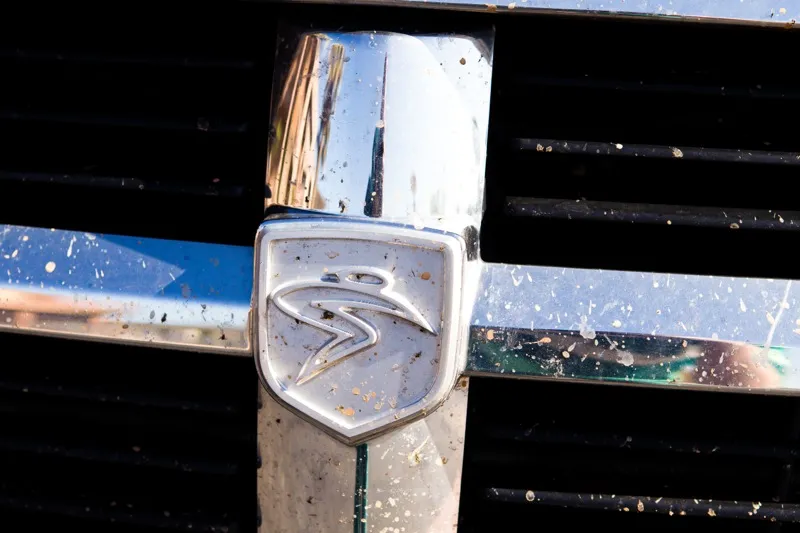Abby Hippely and Ariel Lindsley are two of the best versed and best known professional bike demo program managers in the US. After close to a decade on the road they've honed a specific set of skills that allows them to comfortably live away from home nine months out of the year.
Their annual Santa Cruz demo tour brings them to a half dozen major events, sees them administer close to 50 demos a year, drive 30,000 miles and spend roughly 140 nights sleeping in the van.
In 1998, Hippely, 31, a Pennsylvania native, followed an older sister to Boulder, Colorado where she met Lindsey, 34, a rock climber and cyclist, who moved out there to climb and fell into a professional mountain bike career that saw him come second at the 24-hour nationals in 2002.
The two met at the Full Cycle bike shop and in 2003 they hit the road working for local company Maverick's demo program. It was a gig they ran for five years. After Maverick they worked for Yeti Cycles running their demo program for two years and have since been with Santa Cruz Bicycles for two. BikeRadar caught up with the duo during their summer demo trip through Boulder, Colorado.
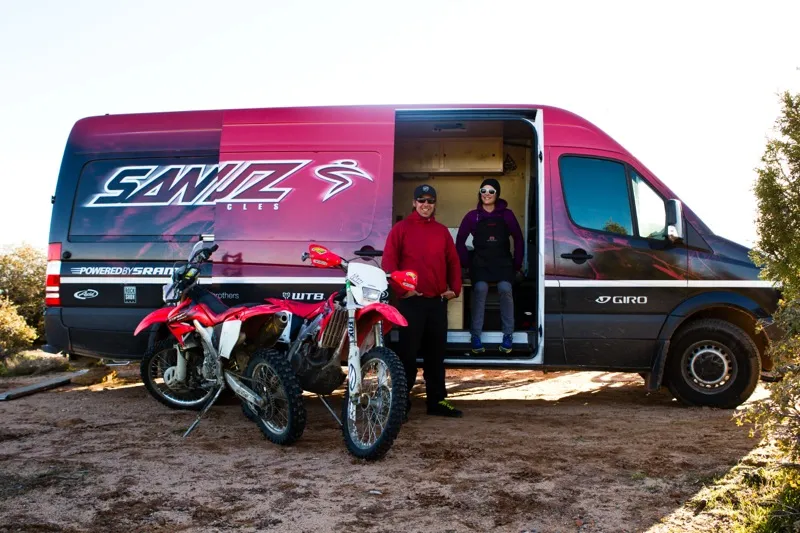
Ariel Lindsley and Abby Hippely live out of Santa Cruz's Sprinter van nine months of the year; motos accompany on a certain special trip to the desert
So you guys met here in Boulder?
Hippely: Yeah, basically through Full Cycle – working there and the riding community there.
Did you both work there?
H: Yeah, at different times.
Lindsley: We met riding with that crew, they were some of the first people to take me mountain biking [in the area].
H: I worked there first before you came in and we started riding bikes together and going to parties.
L: We were running in the same circle.
What's the job? Santa Cruz demo crew – what does that mean?
H: We do everything that you can think of that's associated with running a demo program; that's both execution and planning.
L: Basically how it works is that I order all the frames from Santa Cruz, the parts from SRAM and the other sponsors, and then we build the bikes. Then we arrange the whole tour for the summer, where we're going.
H: I head up scheduling, calling the dealers.
So tour stops are based around dealers?
L: Mostly, with some additional key festivals and stuff like that. The shops really want it; the more on it the dealers are, the more attention they get.
H: We maintain our Facebook page [so people know where to find us] and we do some media stuff, and Mike [Ferrentino, Santa Cruz's marketing director] pulls us into events he's doing. We do a lot of driving...
Are the events you do always festivals or are they races too?
L: Mostly festivals. We try to go to a few races, but when we go to a race we'd just rather race; there's not a lot of demoing going on there.
H: People go to races to race.
L: Mountain Bike Oregon is a good festival to go to. It's more of a ride-based thing. We do Outerbike [and Interbike]; we try to go to where people are around and have time to take a bike and go ride it. A lot of it's just with shops at a trailhead or the nearest place they can do it.
H: There are key places across the US that are just good mountain bike hubs; places people will travel to, to mountain bike. We were just in Vermont at the Kingdom trails; it's a hotspot where people come from [as far as] Quebec [Canada] or from Boston, MA to ride. It's a good ride destination and we have shops there so it's a likely place for us to go [year after year].
And do you guys support the shops in terms of marketing the events?
H: I ask that they advertise. At this point we leave it up to them to make their event, but it's something that we're working on.
What have you guys learned over the years, in terms of what makes the best demo experience?
L: It needs to be a good place for people to try the bikes out, somewhere where the loops aren't super-long – a 30-minute loop with quality trails [is ideal]. We go to a bunch of the same places every year. It doesn't change a ton, but we go to some new places every year.
H: We're finding that mountain bikers want an experience that's more than just racing. Not everyone is a racer so the festivals are cool because you can come as an enthusiast and have a great time. One of the things we did this year is set up a demo request form for our dealers, so we can determine where the interest is. It helped us get to New York and Philadelphia. We try to get to everything, but being one demo team is challenging. Say this is my slot where we're going to hit the East Coast, these three weeks, and if something falls outside of that that's awesome [a festival for instance], it sucks because we miss it.
L: It's regional; everyone is different. Out here [Colorado] people ride on weeknights or from their house, whereas on the East Coast where more people live in big cites they take trips on the weekends.
What's the key to making sure a demo goes well?
L: Well, the bikes have to be working well. If the rider goes out and the bike isn't working, that's a bummer for them. Really explaining the bikes to the rider [so they get on the right one for their riding style] and setting up the sag and suspension right, we're really strict about that. We don't just let people grab bikes. The demos get really hectic sometimes and we get more people than Abby and I can constantly give attention to, so by the time we get to them they're amped up to get on the bike. We've got to slow them down and chill them out, and take the time to do it right; they don't want to sometimes but they're stoked when they come back.
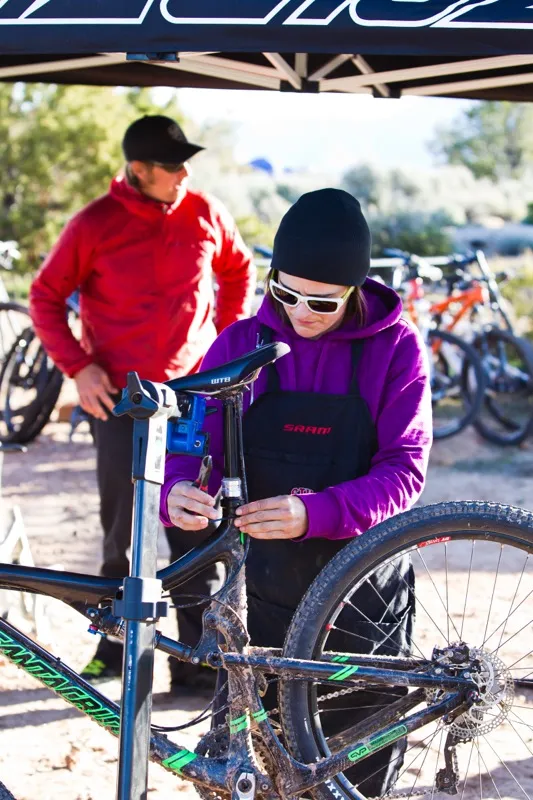
Hippely setting up a RockShox Reverb dropper post
H: It's huge[ly important] – if you're not doing this at a demo you're wasting your time.
L: A lot of people end up learning something at the demo, it's cool – why they should be on this bike or that bike, or trying a wider handlebar.
H: Or how to use a couple of clicks of low-speed compression.
L: They may come back and say, 'this is the bike I should be riding, even though I wanted that one'.
H: It's what we really try to do: offer a one-on-one experience, something more than just putting a person on a bike and sending them out the door.
To do this for 10 years, you guys must love it. What's the most satisfying part of the job?
L: For my own personal, selfish reasons, it's getting to travel and ride new places all the time. When it comes to the actual job part of it, it's when I can clue someone into something that'll better their riding, like showing them a dropper seatpost.
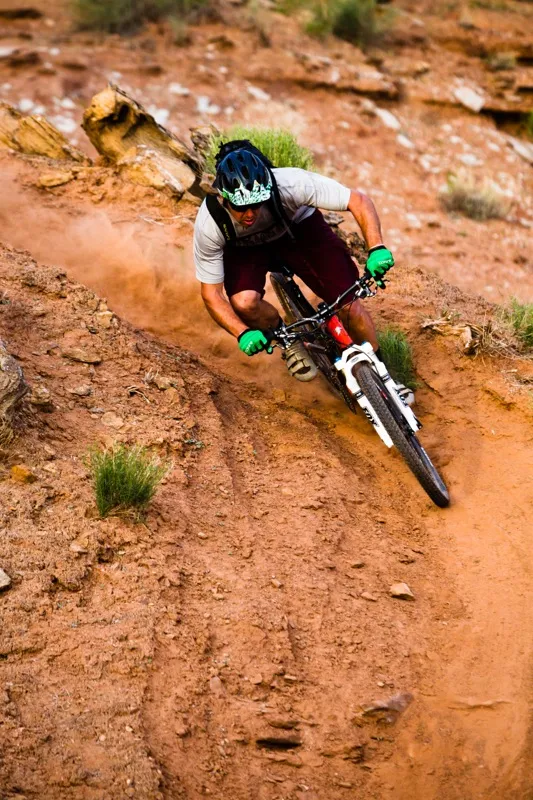
Lindsley demoing a demo in the desert
H: When they feel like they learn something from us and they get stoked about it – you know, when you see it click. Ariel and I have a combined experience of riding and being in the industry for 25 years, and when you can offer that knowledge to people and they show they appreciate it, that's really satisfying. Not being in an office is nice. I couldn't be in an office, eight to five.
L: I like working on bikes too. I like playing with cool new stuff.
Do you guy have a role in new product development?
L: I'd say no, probably; I mean I'd like to think so, but the people at Santa Cruz are a pretty tight-knit group of people.
H: They don't utilize us in that respect; I wish they did more.
Do you guys ever think about getting off the road?
H: Yeah, of course. I think I do more than Ariel.
L: I don't know, I'm torn. There are times I don't want to be traveling, for sure, but then I'd also miss coming to Colorado every year; I'd miss Moab.
Maybe you can direct other crews?
H: We've talked about that. That would be the idea and we'd pop in for some big events. I do enjoy traveling, it would be fun to keep doing it, but just a little less frequently. It's hopefully where we can take it. It means proving to Santa Cruz that it's worth it.
What sold you guys on Santa Cruz? You basically signed on to be at the forefront of introducing their bikes to riders.
L: For me it's just the quality of the bikes. As far as mountain bikes go, the carbon fiber really feels stiff when I ride it. It doesn't feel flimsy or flexy, which is huge for me personally, and the stuff lasts. I think we've come in at a glory time because the bikes are really good. Now things are really working well, everything that we've come out with works and there's not a lot of warranty and stuff [that can ambush us on the road].
H: Our carbon is awesome. I believe in it, I believe what our engineers are telling us and I also believe by feeling it when we're out riding it.
L: There are tons of overqualified people working at Santa Cruz. There are guys in there who are custom frame builders, with their own companies, working in the warehouse at Santa Cruz.
H: Just to work there.
L: When we decided to do the [Tallboy] 29er, there were already people [at Santa Cruz] with a lot of experience building custom 29ers; they had experience with geometry. We spent two years with all of those people collaborating and riding prototypes to develop what we finally came out with. When we came out with it the geometry was really good and people were pumped on it. Tallboy has been a slam-dunk. It can be racy, it can be a trail bike; they just nailed the geometry on it. It's the same with all the other bikes; Santa Cruz are pretty in touch with what people want. I think it's because a lot of people at the company ride. I know everyone says that, but Santa Cruz are a small company and everyone does ride.
What's your most important personal comfort item in the rig?
H: The cooler! It's been the big personal improvement this year.
A cooler?
L: It's a cooler that plugs in so you don't have to deal with ice. Just trying to eat well on the road makes a huge difference for us. We're both athletes and we like to be healthy, so it sucks when your options are...
H: Down to a Cracker Barrel or McDonalds.
L: Yeah.... And then having Whole Foods in every big city helps too, because we can stock up and eat well. We've been eating well [this year] and it makes us happy.

Hippely rips; both were top-tier racers in the past
